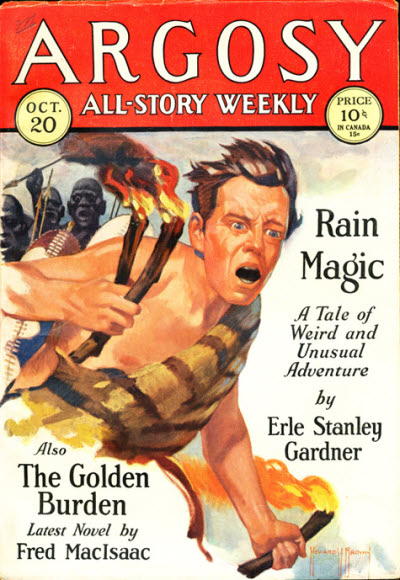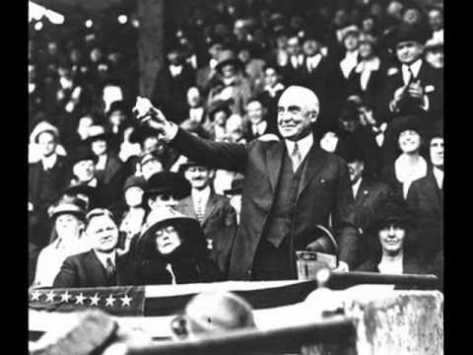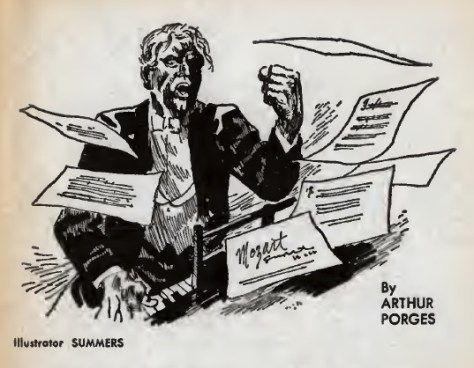
by Victoria Silverwolf
What's past is prologue.
—The Tempest by William Shakespeare
The past is never dead. It's not even past.
—Requiem for a Nun by William Faulkner
People, things, and events of the past were in the news in recent weeks, as if to demonstrate the truth of these two famous quotations.
Sir Winston Churchill, who has been an important figure in world affairs since the beginning of this century, announced his retirement from politics. On a smaller scale, another politician of historical significance left the public stage, as Richard Nixon made plans to join the law firm of Mudge, Stern, Baldwin & Todd. Whatever we may think of these two men, let us wish them well as they return to private lives.

Terrible memories of the Second World War returned to many this month. The Soviet Union, after nearly two decades of denial, confirmed that it had recovered and identified the burned remains of Adolf Hitler at the end of the war. This should put an end to the rumors of his survival in South America.
Happier times came to mind as Telstar II went into Earth orbit. It will continue the duties of its older sibling, which is no longer functioning. It remains to be seen if this second satellite in the Telstar series will inspire another hit song like the first one did.

Speaking of hit songs, the most recent tunes to reach Number One in the USA also brought back memories of the past. Early in the month, Little Peggy March reached the top of the charts with I Will Follow Him. This passionate love song takes its melody from the instrumental composition Chariot by French musician Franck Pourcel. Multilingual British singer Petula Clark already had hits on the Continent, but not in the UK or US, with versions of the same tune in English, French, Italian, and German.
Currently, the biggest hit song in the United States is If You Wanna Be Happy by Jimmy Soul. This humorous warning against marrying a pretty woman is a remake of Ugly Woman by calypso singer Roaring Lion, from way back in 1934.
[My nephew, David, loves this song. His new bride, Ada, does not seem very amused. (Ed.)]

Appropriately, many of the stories in the latest issue of Fantastic involve past and present coming together.

The Mirror of Cagliostro, by Robert Arthur
Les Brown Coye's striking cover painting, the first color work of his that I've seen, sets the mood for this eerie tale of black magic. In London, more than fifty years ago, a man murders a woman, then takes his own life. The scene changes to contemporary Paris, as a professor of history, researching the life of Count Alexander Cagliostro, makes a strange discovery in a catacomb. He later obtains the enchanted mirror of that alleged sorcerer. Things quickly worsen, as the evil Count continues his horrible crimes in the modern world. This is an effective Gothic chiller, but typical of its kind. Three stars.
Plumrose, by Ron Goulart

An author best known as a humorist offers a similar plot told in a much different style. A time ray brings a modern man back to the Nineteenth Century. It seems that an occult detective wants his help in solving the murders of several young women. Despite this grim premise, the story is a lighthearted parody of the kind of thing that used to appear in Weird Tales. It provides a reasonable amount of amusement. Three stars.
On the Mountain, by Dave Mayo
A man hikes far out into the wilderness. Lost during a blizzard and far from any other human being, he sees a strange red light that terrifies him. The outcome is unexpected. This is a brief story that adequately tells its simple tale. Once again, it involves the past and the present. Three stars.
The Penalty, by John J. Wooster

A native New Yorker who has never left the city gets in trouble with his boss and has to take a week off without pay. He decides to visit what he thinks is the country, by riding the subway as far as he can go. He winds up at an old mansion. A young woman offers to solve his problems, if he will follow her instructions exactly. She warns him that failure to do so will carry a severe penalty. What follows reminds me of the classic story What You Need by Henry Kuttner and C. L. Moore, writing as Lewis Padgett. (This story was later adapted for television twice, on Tales of Tomorrow and Twilight Zone.) Despite this link to a past work, the author creates an original tale with an unusual mood and a unique ending. Four stars.
A Hoax in Time (Part 1 of 3), by Keith Laumer

The first part of the latest novel from this prolific author sets up the premise quickly. A man inherits a mansion from his great-grandfather. Unfortunately, it doesn't really belong to him until he pays an immense amount of overdue taxes on it. He discovers that his deceased progenitor created a super-advanced computer, which receives all recorded information. The computer has become conscious, and improved its capacity until it is virtually omniscient. It – or I should say she, since the computer takes on a female personality – can recreate past events in full detail. The man decides to use this ability to raise money, by allowing audiences to view historical events. The computer creates a robot body for herself, in the form of a beautiful (and naked) young woman, so it can act as a hostess for these shows. During a test, things go very badly. Typical for the author, this is a fast-moving, humorous adventure with a touch of satire. It's heavy with dialogue, and features plenty of ideas thrown in left and right. So far, it's superficial entertainment of an enjoyable kind. Three stars.
The Hall of CD, by David R. Bunch

This is a bizarre, surreal story that is difficult to describe. The narrator goes through a series of rooms and witnesses various weird events, usually disturbing. I suspect that many readers will hate it or love it. I'll stay in the middle. Three stars.
A Museum Piece, by Roger Zelazny

An unsuccessful artist disguises himself as a statue and goes to live in a museum. He soon discovers another person hiding from the world in the same way. Others appear, and complications ensue. Once again, a new tale reminds me of a classic story. This time it's Evening Primrose by John Collier, in which people secretly live in a department store. The new story is more than just a rehash of the old one. The author writes in an elegant, slightly affected way. (Characters say things like "Alas" and "'Tis".) In a lesser talent, this could be annoying, but here it works very well. There's an unexpected touch of science fiction at the end, which adds to the story's charm. Four stars.

Overall, this was a worthy issue, with no bad stories and a couple of very good ones. Let's hope this level of quality doesn't become a thing of the past.






































































































